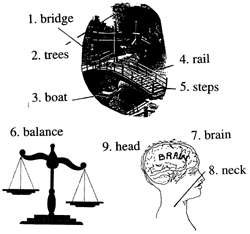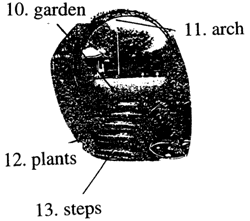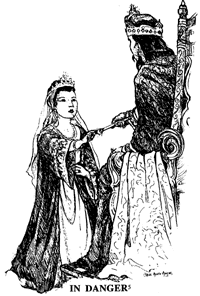Unit 24: Conjunctions
Pictured Words
New Words

| 1. bridge
|
| 2. trees
|
| 3. boat
|
| 4. rail
|
| 5. steps
|
| 6. balance
|
| 7. brain
|
| 8. neck
|
| 9. head
|

| 10. garden
|
| 11. arch
|
| 12. plants
|
| 13. steps
|
Nouns
Adjectives
Sayings
The brain is only a part of our nervous system but it is the chief part.
We must let our brains do work when we give our attention to the rhythm of verse.
There is a bridge to the other side of the river but you may also take a boat.
The farm is just over the bridge and a little farther on.
Is there an arch in the garden or are there only flowers?
Where is the chemical balance for me to make use of while I am waiting?
Little pigs soon get big, but that means their existence is finished sooner.
A monkey sends the others away while it takes its food.
Conjunctions
We have already seen the conjunctions "and", "or" which make a join between various parts of speech.
There are several others that are worthy of some explanation.
They are: but, where, when and while.
But
The function of this conjunction is to join together statements that are to some extent opposite in meaning.
The second statement gives another view to the first.
David became stronger and stronger, but those on Saul's side became more and more feeble.
I will make an agreement with you, but on one condition.
you will not come in here, but the blind and the feeble-footed will keep you out.
I am living in a house of cedar, but the ark of God is housed inside a tent.
Where, while, when
These conjunctions join the main statement to the dependent one.
They let us see the place or time at which an action was done.
"Where" gives the place of the action.
The word order is the same as in the main statement.
"While" gives the time during which the action took place.
"When" gives the time at which the action took place.
Both "while" and "when" are generally put at the start of the sentence or phrase.
Examples are
| when
| When you give money to the poor, do not make a noise about it.
|
| when
| When you make your prayer, go into your private room.
|
| when
| when he had got into a boat.
|
| where
| where thieves may come in by force.
|
| where
| where it may be turned to dust by worms and weather.
|
| where
| among the stones, where it had not much earth.
|
| while
| while he was saying these things to them.
|
| while
| while they were going away.
|
| while
| while he was still talking to the people.
|

In Danger
Now on the third day, Esther put on her queen's robes, and took her place in the inner room of the king's house, facing the king's house; and the king was seated on his high seat in the king's house, facing the doorway of the house.
And when the king saw Esther the queen waiting in the inner room, looking kindly on her he put out the rod of gold in his hand to her.
So Esther came near and put her fingers on the top of the rod.
Then the king said, What is your desire, Queen Esther, and what is your request?
I will give it to you, even to the half of my kingdom.
And Esther in answer said, If it seems good to the king, let the king and Haman come today to the feast which I have made ready for him.
Then the king said, Let Haman come quickly, so that what Esther has said may be done.
So the king and Haman came to the feast which Esther had made ready.
Additional Reading
Esther's name had the sense of "Star".
She was married to the King of Persia and was specially taken for him from among many other girls in his kingdom because of her great beauty.
She was also a girl of self control in the face of danger.
There was a law in the days of Esther that no one might come into the king's inner room unless sent for.
If one was so foolish as to do so, he might only be safe if the king put out his rod of gold for him to put his fingers on.
It is good that Esther was given the rod so that she might keep her life.
This gives us an example of two things: the power of the king and the danger to Esther.
The king was very powerful.
His rule was over all the lands between India and Ethiopia.
He had many divisions in his kingdom, with many languages in use and different classes of writing for the different nations.
Naturally, the king had great power and respect.
He did whatever seemed best to him.
It was because he had given a feast to all his many captains and rulers that the trouble came about which made him take Esther as his new Queen.
She took the place of a Queen who had taken no notice of the king's orders when his feast was going on.
So Esther's position as a new Queen in the kingdom was not very safe.
This made it very dangerous for her to come to the king when not asked and whilst he was seated on his throne.
But because Esther was very beautiful and because she made the attempt in the face of such great danger, she got a warm welcome from the king.
He held out his golden rod for her to put her fingers on.
He gave her the chance to make her special request.
Her desire was that he should come to a feast which she would have in her house.
You see, the king did not have the same house as the queen.
Each had a separate house, which was very large, with its own servants, gardens and foods.
When he came to her house, her special request was to keep her people safe from destruction.
This was necessary because there were frequent troubles which came about within his kingdom.
There were always different opinions between its different nations, and the separate rulers took every chance to put those of an opposite race to destruction.
Esther's nation was one that was about to be put to an end.
She herself would also meet her end if that came about.
So, she kept to the ways of her times and gave a feast for the king at which she might put her question.
When she put the question to him he was ready to keep her people safe.
He sent letters to all the divisions of his large kingdom, to every one of its nations in the writing commonly used there, and in the language used there.
He gave authority for every person of Esther's race to be safe and not to come to his end.
His statement was taken by men on horseback, going on quick-running horses used only for the king's business.
It was the law that a writing in the king's name and stamped with the king's ring could not be changed.
So Esther's race was saved throughout all the divisions of the kingdom as a result of her strong action in the face of great personal danger.
Helpful Notes
| queen's robes
| the dress of a female ruler.
|
| rod of gold
| this ruler's stick of gold.
|
| half of kingdom
| showing a desire for full ageement.
|
| feast
| a special meal for important persons.
|
| King of Persia
| ruler of a large country in Mesopotamia.
|
| so foolish as to do
| taking a dangerous chance.
|
| India and Ethiopia
| see Unit 39, Ethiopia is in North Africa.
|
| classes of writing
| the different ways of writing in other countries.
|
| captains and rulers
| the men who controlled state and country.
|
| quick-running horses
| horses used for sending messages quickly.
|
| stamped
| the ruler's messages were given marks special to him.
|
Interesting Facts And Records
Sons of Abraham
Many nations have respect for Abraham as their father.
The Moslems, the Jews and the Samaritans have looked back to him.
The "Woman by the Well" was a Samaritan and she said "Our fathers gave worship on this mountain, but you Jews say the right place for worship is in Jerusalem".
There was a long standing argument between these two nations.
Jesus took no pleasure in this argument.
He told a story about the help a Samaritan man gave to one who had been attacked on his journey from Jerusalem.
It now has the name of "The Story of the Good Samaritan".
Abraham at first had the name of "High Father", or "Abram".
In Genesis it is said that God made a change in his name to "Father of Many Nations", or "Abraham".
And that is just what he has become.
Abraham was born in a very old place with the name of Ur.
His father took him to a land in Turkey and there Abram made the observation that God said to him to go to a new country.
It now has the name of Israel.
His marriage to Sarah did not give him any children until she was very old, in fact long after her time for giving birth.
She was in her nineties and Abraham was then 100 years old.
This has an important result in law.
Every woman is now seen as able to give birth to children until her death.
As a result, no details about her property may be completed before she comes to the end of her existence.
It is a strange fact, almost a fiction, but it is true.
The nations that come from Abraham have always been in argument, even in these days of democracy, on the one hand, and of communism, on the other.
They have nothing in common at any point.
Isaac and Jacob followed Abraham and were the ones from whom came the Jewish nation.
Isaac was the true son of Abraham and Sarah.
This nation has now gone on trade and business to many countries.
There they keep to their religious beliefs.
There has been no limit to the degree of attention they have given to their personal and private religious ways.
As a result they have often had bitter experiences to put up with.
We have seen in our time the way they were given no peace in Germany when hammered out of existence by the Nazis.
A great amount of work is being done by the United Nations to make the peoples of the Palestine countries one unit and thus get peace between those great nations.
But they keep on their fight with fearful possibilities.
If only they could "kiss and make up" it would be good for all.
In these days of the atom bomb, the possibilities are frightening if there should be war in those parts.
The results of radiation are just too serious to have in mind.
So, the sons of Abraham are now just as God said they would be, "As the sands on the seashore" for number.
But, it is to be hoped they can give Him the respect both He and Abraham are worthy of by their ways of peace.
Not do it just by their words.